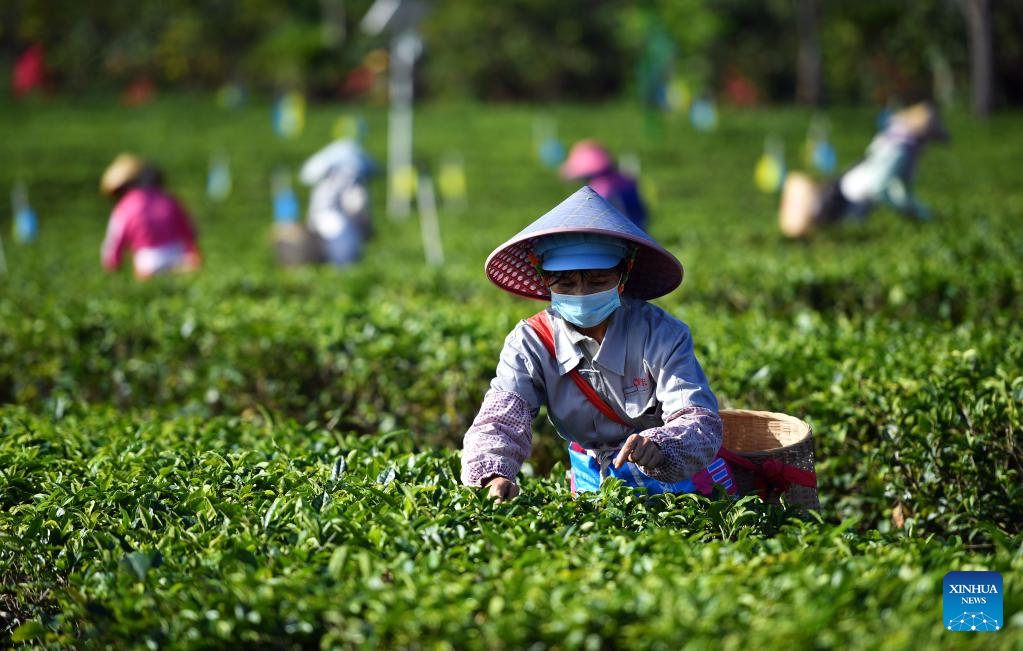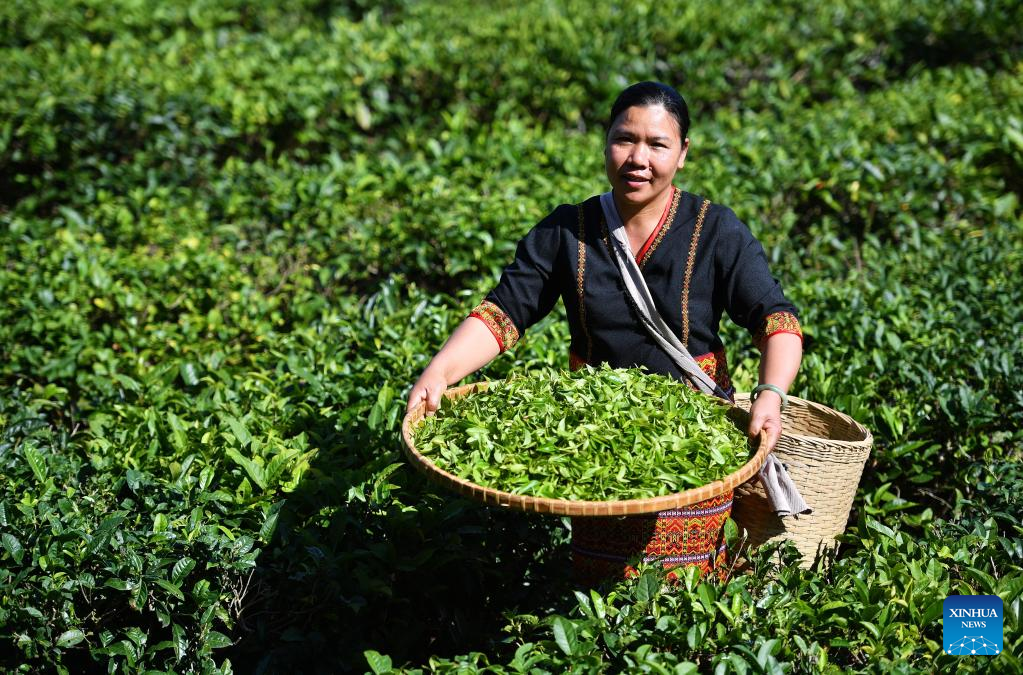
Fu Xiuxiang picks tea leaves at an organic tea plantation in Baisha Li Autonomous County of south China's Hainan Province, Feb. 27, 2020. (Xinhua/Guo Cheng)
HAIKOU, May 23 (Xinhua) -- When tourists arrive, Fu Xiaofang will make tea for them skillfully and fastidiously, unwilling to omit even one step which she thinks would be like blasphemy against her farm produce.
Fu, 44, is the founder of an organic tea plantation in Baisha Li Autonomous County of south China's Hainan Province.
"Life is like tea, refined again and again to have a mellow fragrance," Fu said, noting that tea leaves can only be made through several steps, including roasting, water-removing, and rolling. Her career has also experienced struggles.
With a pleasant climate, abundant rainfall, and fertile soil, the Baisha meteorite crater area is suitable for tea planting. In 2008, Fu returned to her hometown to start a business. Gathering five local farmers, she set up a professional cooperative and opened a tea plantation covering about 1.47 hectares near the crater.
Starting from scratch, every mile on the way forward was difficult. Fu led the group to turn over the soil and left the land uncultivated for three years to improve it.
With no herbicide, they weeded row after row, but the grass grew again quickly. Pests were also a headache. When the pest problem was severe, all the leaves and buds, ready for harvest, were eaten up overnight.
One night, Fu checked the pest situation on the tea plantation. The sound of pests biting the tea tree drove her crazy, and she suddenly burst into tears, even thinking of giving up.
After calming down, Fu began to think of different ways to prevent the pests, like using many sticky boards and solar lamps to kill pests.
After planting the tea, Fu began to concentrate on the tea-making process. She fried tea leaves with bare hands all year round, only to find that her fingerprints had blurred under the high temperature over time. She tried the tea frequently to ensure the taste, which led to her stomach illness.
Through ups and downs, the tea plantation finally welcomed a harvest. In 2014, the plantation was certified as China's organic tea plantation, becoming the first organic tea plantation in Hainan. Since 2015, the tea plantation has passed the organic certification of the European Union and the United States, and the top tea leaves are sold across the country.
The tea business also benefitted local people. Over the past years, Fu helped lift more than 1,000 poor households out of poverty by providing jobs and making farmers shareholders.
The number of local farmers working on the tea plantation has increased to 186, all from six nearby villages. Villagers flexibly choose their working hours and can earn more than 100 yuan (about 15 U.S. dollars) a day.
Fu Xiuxiang, 57, from a nearby village, has worked on the tea plantation for ten years. She is now skilled at picking tea, weeding, applying organic fertilizer, and stir-frying tea.
Ten years ago, her husband received several surgeries due to illness, and thus the family slipped into debt. To take care of her family, Fu Xiuxiang could not work far away but came to the tea plantation.
Over the years, she not only paid off debts but also saved money to build a new house. Now, she is the monitor of the tea picking team, earning more than 4,000 yuan a month.
"Working here makes me feel at home," said Fu Xiuxiang, who is used to staying on the tea plantation even when there is no work to do.
"Life is getting better and better," said a smiling Fu Xiuxiang. She is uneducated and was afraid of speaking in public, but now she has learned many skills and become more open-minded and optimistic. When visitors come, she will happily sing the folk songs of the Li ethnic minority.
With the support of the local government, Fu Xiaofang built homestays and developed tourism, and the rooms are always booked up during the holidays.
Now the tea plantation has expanded from 2 hectares to 20 hectares. The plantation is starting a new project to improve tourism facilities to accommodate more tourists.
Fu Xiaofang said she would work harder on the tea plantation in the hope of bringing prosperity to more local villagers. ■

Fu Xiaofang shows tea leaves at an organic tea plantation in Baisha Li Autonomous County of south China's Hainan Province, Feb. 27, 2020. (Xinhua/Guo Cheng)



